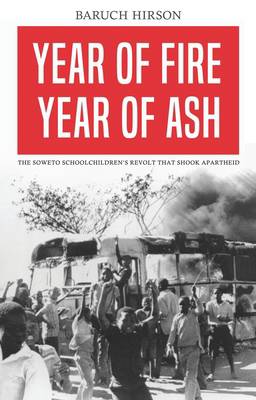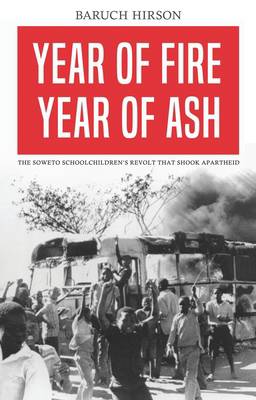
- Afhalen na 1 uur in een winkel met voorraad
- Gratis thuislevering in België vanaf € 30
- Ruim aanbod met 7 miljoen producten
- Afhalen na 1 uur in een winkel met voorraad
- Gratis thuislevering in België vanaf € 30
- Ruim aanbod met 7 miljoen producten
Zoeken
Year of Fire, Year of Ash
The Soweto Schoolchildren's Revolt that Shook Apartheid
Baruch Hirson
Paperback | Engels
€ 50,95
+ 101 punten
Omschrijving
'We can say without fear of being contradicted by history, that June 16, 1976 heralded the beginning of the end of the centuries-old white rule in this country.'
Nelson Mandela
Originally banned on publication by the apartheid government, Year of Fire, Year of Ash is an eye-opening account of how, in June 1976, 20,000 school students faced down the tanks and guns of a vicious racist regime, in a revolt that galvanized the black working-class and became a pivotal turning point for the anti-apartheid movement. More than this, the book overturns much of the conventional logic that served to explain the event at the time, showing it was not simply a student protest, but part of a wider uprising.
Released in this new edition to mark the fortieth anniversary, Year of Fire, Year of Ash provides an unparalleled insight into the origins and events of the uprising, from its antecedents in the 1920s to its role in inspiring global solidarity against apartheid. As South Africa experiences a new wave of popular discontent, and as new forms of black consciousness come to the fore in movements around the world, Baruch Hirson's book provides a timely reminder of the Soweto revolt's continued significance to struggles against oppression today.
Nelson Mandela
Originally banned on publication by the apartheid government, Year of Fire, Year of Ash is an eye-opening account of how, in June 1976, 20,000 school students faced down the tanks and guns of a vicious racist regime, in a revolt that galvanized the black working-class and became a pivotal turning point for the anti-apartheid movement. More than this, the book overturns much of the conventional logic that served to explain the event at the time, showing it was not simply a student protest, but part of a wider uprising.
Released in this new edition to mark the fortieth anniversary, Year of Fire, Year of Ash provides an unparalleled insight into the origins and events of the uprising, from its antecedents in the 1920s to its role in inspiring global solidarity against apartheid. As South Africa experiences a new wave of popular discontent, and as new forms of black consciousness come to the fore in movements around the world, Baruch Hirson's book provides a timely reminder of the Soweto revolt's continued significance to struggles against oppression today.
Specificaties
Betrokkenen
- Auteur(s):
- Uitgeverij:
Inhoud
- Aantal bladzijden:
- 366
- Taal:
- Engels
Eigenschappen
- Productcode (EAN):
- 9781783608966
- Verschijningsdatum:
- 15/08/2016
- Uitvoering:
- Paperback
- Formaat:
- Trade paperback (VS)
- Afmetingen:
- 142 mm x 224 mm
- Gewicht:
- 453 g

Alleen bij Standaard Boekhandel
+ 101 punten op je klantenkaart van Standaard Boekhandel
Beoordelingen
We publiceren alleen reviews die voldoen aan de voorwaarden voor reviews. Bekijk onze voorwaarden voor reviews.











